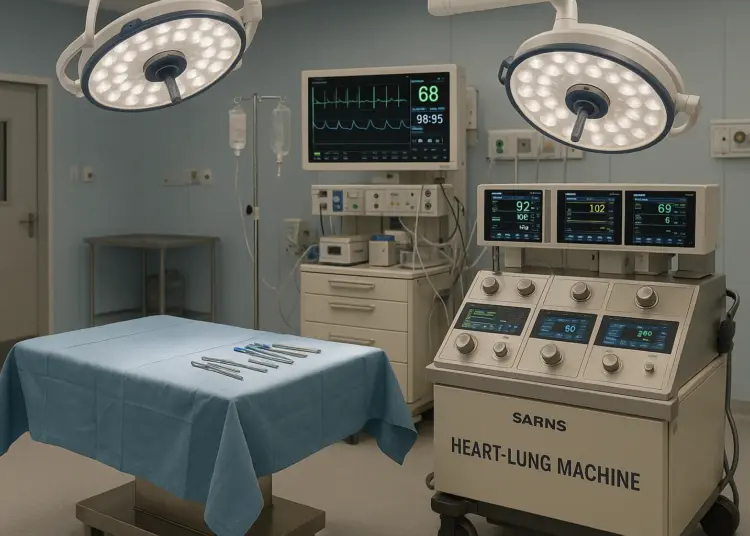Story Highlight
– Dysfunctional dynamics in Belfast cardiac surgery team identified.
– Report highlights ongoing bullying and safety concerns.
– Over 2,000 staff witnessed inappropriate behavior reported.
– Trust under special measures for serious performance issues.
– Minister emphasizes patient safety as top priority.
Full Story
An independent investigation has highlighted ongoing issues within a cardiac surgical team at the Belfast Health and Social Care Trust (BHSCT), revealing a “significant risk” related to troubling interpersonal dynamics and allegations of bullying. This scrutiny follows a previously leaked inspection report, which identified unprofessional conduct among cardiac surgeons, including throwing instruments during operations and mistreating junior colleagues.
The Royal Victoria Hospital’s cardiac unit, which performs around 1,000 operations annually and caters to patients throughout Northern Ireland, has been under increased oversight since these serious accusations first surfaced. In May, Health Minister Mike Nesbitt responded to the findings by implementing enhanced accountability measures for the trust, aimed at addressing the serious concerns about patient safety and workplace culture.
The report, authored by experts Peter McBride and Dr. Jennifer Hill, delves into the BHSCT’s handling of the initial allegations regarding the cardiac surgery unit. The researchers noted a “fundamental breakdown” in relationships among some of the leading surgeons, leading to a lack of trust and posing a potential threat to both service delivery and the safety of patients. In their recommendations, the report called for ongoing monitoring of relationships within the consulting team, emphasizing the need to ensure that collaborative practices genuinely foster a secure environment.
In a statement regarding these findings, Jennifer Welsh, chief executive of the Belfast Trust, expressed her commitment to acting on the recommendations. She stated that these suggestions represent a crucial progression in responding to Minister Nesbitt’s earlier interventions. “We will move forward together, and we will build a workplace that is a safe and supportive environment for all,” added Welsh.
Moreover, the report assessed the culture of the trust concerning the reporting of misconduct. It surveyed staff to understand experiences related to raising concerns about inappropriate behaviour. Over 2,000 staff members reported having witnessed or experienced behaviours that warranted reporting; however, only approximately 700 chose to file formal complaints. The survey, which garnered responses from around 3,500 employees, revealed a pervasive belief that reporting issues would not lead to any changes.
Interestingly, while the number of cases related to bullying and harassment has remained consistent over the past five years, reports of whistleblowing have surged, alongside a rise in legal challenges against the trust. The investigation’s data indicates that many employees feel disillusioned and apprehensive about the potential repercussions of coming forward.
Nesbitt indicated that the Belfast Trust has been placed under “level five performance accountability,” a classification reserved for the most critical cases. He underscored that for the trust to move forward from these measures, there must be a strong display of sustainable improvement and adherence to the recommendations outlined in the report. Continuous patient safety must remain the top priority, he asserted, alongside regular monitoring of the trust’s execution of the proposed changes.
The report also highlighted the extensive pressures faced by BHSCT, characterising it as a large and complex organisation that mirrors the broader challenges within Northern Ireland’s healthcare system. It acknowledged that such systems often contain instances where conduct deviates from established expectations and standards. Nonetheless, the report stressed the importance of having reliable processes in place that ensure effective responses when behaviours fail to meet these benchmarks.
In light of these findings, the Belfast Trust is poised to engage in a thorough review and improvement of its practices across the cardiac surgical team and potentially throughout the wider organisation. With the backing of the Health Minister, the trust is aiming to foster not only an environment conducive to quality patient care but also one that prioritises the well-being and support of its medical personnel.























This report is deeply concerning. A functioning cardiac surgery service depends on clear leadership, mutual respect and robust systems that protect patients and support staff. The scale of reports here suggests systemic failures in culture and governance that must be addressed urgently. Immediate steps should include independent oversight of safety practices, transparent action on accountability, accessible and trusted routes for raising concerns, and targeted support for staff wellbeing and teamworking. Restoring patient confidence will require sustained leadership commitment and measurable progress on safety and culture.
This is deeply concerning. Patient safety depends on a culture where staff can speak up without fear and where leaders act quickly to address unacceptable behaviour. The priority must be stabilising the team, supporting anyone affected, and putting clear, enforced processes in place for reporting and remediating misconduct. Robust oversight, transparent accountability and urgent work on team dynamics and wellbeing are essential to protect patients and restore confidence.
This report is deeply concerning. Patient safety must be the absolute priority and the behaviour described undermines trust and clinical performance. Leadership must take clear responsibility to address misconduct, ensure transparent accountability and provide support for staff who raise concerns. Urgent action is needed to rebuild a culture where respectful teamwork and open communication are the norm and where patient care cannot be compromised.
This report is deeply worrying. Patient safety must be the top priority and a culture that allows bullying or intimidation undermines care and puts lives at risk. Leaders must take urgent and decisive action to restore professionalism and accountability, ensure robust oversight and support for staff who raise concerns, and implement targeted interventions to improve teamwork and communication. Staff must feel safe to speak up without fear of reprisal and patients must be confident they are being treated in a culture that prioritises their welfare.